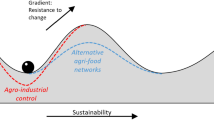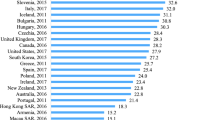Abstract.
This paper uses the 1698 Slavonian census to illuminate features of social organization and productive activity of an eastern European population under the New Feudalism of the 17th century. In particular we investigate the ability of community or kinship networks to provide substitutes for missing markets in securities and production factors. It is found that kinship networks increase the efficiency of agricultural production by facilitating the exchange of oxen. This confirms contemporary reports that draft animals were the critical constraint to the expansion of agricultural output. We also find that kinship networks fail to reduce the variability of output through mutual harvest insurance.
Similar content being viewed by others
Author information
Authors and Affiliations
Additional information
Received: 03 November 1998/Accepted: 16 June 1999
Rights and permissions
About this article
Cite this article
Kohler, HP., Hammel, E. On the role of families and kinship networks in pre-industrial agricultural societies: An analysis of the 1698 Slavonian census. J Popul Econ 14, 21–49 (2001). https://doi.org/10.1007/s001480050158
Issue Date:
DOI: https://doi.org/10.1007/s001480050158




